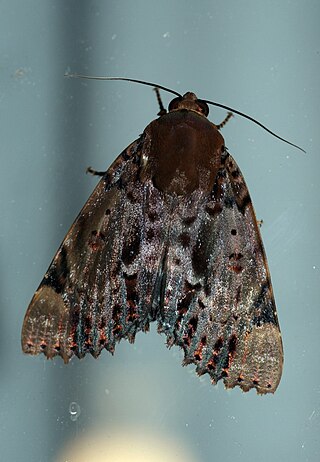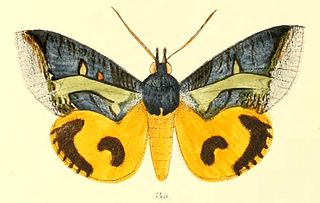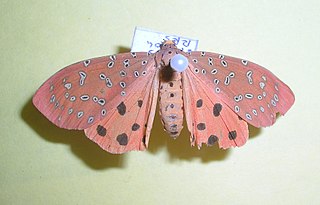
Marumba dyras, the dull swirled hawkmoth, is a species of hawk moth described by Francis Walker in 1856. It is found in South-east and South Asia.

Nepita is a monotypic moth genus in the subfamily Arctiinae erected by Frederic Moore in 1860. Its only species, Nepita conferta, the footman moth, was first described by Francis Walker in 1854. It is found in India and Sri Lanka.

Corcobara is a monotypic moth genus of the family Erebidae first described by Frederic Moore in 1882. Its only species, Corcobara angulipennis, described by the same author in the same year, is found in India, Thailand, Cambodia, Myanmar, Malaysia, Indonesia, New Guinea, Sri Lanka and the Solomons.

Hulodes caranea is a species of moth of the family Erebidae first described by Pieter Cramer in 1780. It is found from India, Sri Lanka, Myanmar, Java, Hong Kong to Queensland and New Guinea, it is also found on the Marianas and Carolines.

Arcte coerula, the ramie moth, is a moth of the family Noctuidae. The species was first described by Achille Guenée in 1852. It is found from in south-east Asia, including Fiji, India, Sri Lanka, Myanmar, Japan, New Guinea, Taiwan and Norfolk Island. It has been recently observed in Hawaii, on the island of Maui.

Thyas coronata is a species of moth of the family Erebidae first described by Johan Christian Fabricius in 1775. It is found from the Indo-Australian tropics of southern China, Taiwan, Japan, Nepal, India, Sri Lanka to Micronesia and the Society Islands.

Eudocima phalonia, the common fruit-piercing moth, is a fruit piercing moth of the family Erebidae. The species was first described by Carl Linnaeus in his 1763 Centuria Insectorum. It is found in large parts of the tropics, mainly in Asia, Africa and Australia but introduced into other areas such as Hawaii, New Zealand and the Society Islands. It is one of major fruit pests in the world.

Eudocima homaena is a moth of the family Erebidae first described by Jacob Hübner in 1816. It is found in the Indian subregion, Sri Lanka, Myanmar, Taiwan, the Nicobars, Peninsular Malaysia, Borneo, the Philippines and on Christmas Island. It is a major pest on orange plants.

Eudocima salaminia, the green fruit-piercing moth, is a moth of the family Erebidae. The species was first described by Pieter Cramer in 1777. It is found from India, and across south-east Asia to the Pacific Islands. In Australia it occurs in the Northern Territory, Queensland and New South Wales. The adult is a fruit piercer.

Asota caricae, the tropical tiger moth, is a species of noctuoid moth in the family Erebidae. It is found from the Indo-Australian tropics of India and Sri Lanka to Queensland and Vanuatu.

Asota plana is a moth in the family Erebidae first described by Francis Walker in 1854. It is found from the Oriental tropics east to New Guinea.

Asota ficus is a moth in the family Erebidae first described by Johan Christian Fabricius in 1775. It is found in Afghanistan, Bangladesh, China, Taiwan, India, Indonesia (Sumatra), Laos, Myanmar, Nepal, Pakistan, Sri Lanka, Thailand and northern Vietnam.

Acosmeryx shervillii, the dull forest hawkmoth, is a moth of the family Sphingidae. The species was first described by Jean Baptiste Boisduval in 1875. It is found from the Indian subregion, Sri Lanka, to Sundaland, the Philippines and Sulawesi. Acosmeryx pseudonaga is sometimes treated as a valid species.

Trabala vishnou, the rose-myrtle lappet moth, is a moth of the family Lasiocampidae. It is found in southern Asia, including Pakistan, India, Bangladesh, Thailand, Sri Lanka, Myanmar, Java, China, Japan, Taiwan, Hong Kong, Vietnam and Indonesia. Four subspecies are recognized.

Mangina argus, the crotalaria podborer, is a moth of the family Erebidae. The species was first described by Vincenz Kollar in 1847. It is found in south-east Asia, including Zhejiang, Fujian, Jiangxi, Guangxi, Guangdong, Yunnan, Taiwan, Hunan, from southern India to Kashmir, the Himalayas, Nepal, Bhutan and Sri Lanka.

Ambulyx substrigilis, the dark-based gliding hawkmoth, is a species of moth of the family Sphingidae. It was described by John O. Westwood in 1847.

Arctornis submarginata is a species of moth of the subfamily Lymantriinae of family Erebidae. It is found in the north-eastern Himalaya and Sikkim, Sri Lanka, on Borneo and Sumatra and in northern Australia.

Somena scintillans, the yellow tail tussock moth, is a moth in the family Erebidae described by Francis Walker in 1856. It is found in northern India, Sri Lanka, Myanmar and the Andaman Islands. Though considered a minor pest, larva can sporadically be a serious pest.

Aloa lactinea, the red costate tiger moth, is a moth of family Erebidae. The species was first described by Pieter Cramer in 1777. It is found in India, Japan, southern and western China, Taiwan, Java, Sumatra, Sri Lanka, Myanmar and the Philippines.

Autoba abrupta is a species of moth of the family Erebidae. It is found in Papua New Guinea, Thailand, and Australia. The species is largely used by the name Eublemma abrupta in Indian and Sri Lankan texts.




















